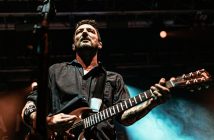Christopher The Conquered Is ‘Giving Up On Rock & Roll’
Interview by Annette Hansen
Rock ‘n’ roll has been an ideal that has been imitated and emulated in music for decades. For singer/songwriter Christopher The Conquered, that persona of rock ‘n’ roll feels too much like a mask. As the up-and-coming musician makes his way onto the scene with his upcoming debut album, I’m Giving Up On Rock & Roll, he talked with Highlight about how he hopes to move beyond the rock ‘n’ roll guise and offer something more tangible and real.
Next month you’ll be releasing your debut album, I’m Giving Up On Rock & Roll. What is it about rock and roll that you’re giving up on?
The album’s not really about rock ‘n’ roll as a type of music. The way that I like to describe it is that when I wrote the song “I’m Giving Up On Rock & Roll,” which is the title track, I wrote it for a lot of different people. I wrote it for the recent divorcee who’s finally freed from an oppressive marriage or I wrote it for the priest who’s left the church and has seen the glorious and weird and disgusting ways of the world and all of it alike, and that’s what it’s about.
You’ve said that rock ‘n’ roll is sort of a persona and being genuine as a performer is something you strive for. Why do think it’s important for you to continuously offer up an honest portrait of yourself in all aspects of your personal life and especially your career?
Well, because I think that for me personally it’s a much more fulfilling way to live, and it’s part of my mission because I think the world lacks, in our day to day experiences, sincerity and presence of mind. We’re all striving for a dream that we’ll never reach, hopefully we’re not all, but for me, that’s why I’m ‘giving up on rock ‘n’ roll.’ I realized that I was constantly pushing for this thing. I thought that there was going to be some leprechaun’s pot of gold at the end of the rainbow, but there’s not. The rainbow just keeps going, and the rainbow’s beautiful [Laughs.]. It’s an old idea, but for me, I can achieve that goal with each performance by being very present and making that a unique moment and taking advantage of the people that are there to make a unique moment. That’s what my shows are about.
How do you feel like you accomplish that level of honesty as a musician and a performer?
As a performer, I think anybody that comes to a show will be able to answer that question pretty obviously. I definitely utilize a large amount of improvisation in my show. Songs don’t begin and end the way that they would on the record. They start and then they go into stories or other songs or somebody else doing something and then coming back around. It can be anything and everything, and whether or not it’s musically refined, I would hope that, at the very least, it’s that thing which is unique in that moment that I think is beautiful. There are people out there who appreciate that and hunger for that. In the songwriting, I almost feel like this album is about that idea and less like totally achieving that idea in terms of songwriting. My view point was sort of evolving as I was writing the songs. As I continue to develop what I’m doing as a composer, I am trying to, more and more, put really honest assessments on the page. That can sometimes be ugly, and I’m working on just letting it be ugly.
How do you feel that ideal is represented on I’m Giving Up On Rock & Roll?
Well, I think the song “I’m Giving Up On Rock & Roll” and the song “I’m Not That Famous Yet,” which is the last song on the album, I think those are really good examples of that because they both are written directly as an emotional response to my experiences in looking for that light at the end of the tunnel, you know, pot of gold thing in music. That’s why I use rock ‘n’ roll as the metaphor, if you will, and fame as the metaphor. Not everybody’s looking to be a professional musician or somebody famous, but we all have our own goals. To me, those [songs]are the most honest in terms of ‘this is who I am’ on the page and what I’m thinking about and dealing with, and hopefully they strike a universal tone too.
I think everybody’s kind of had that feeling of we have these ideals of things and of how we think things are going to play out, and they almost never work out like that.
Yeah, like you’re a journalist, and I’m sure there are publications that you are deliberately trying to one day contribute to this publication or that publication, or your real goal is to be this type of correspondent or whatever. It’s fantastic to work on those things and to have goals, but to also have to live your life as the person you are today, so to find that balance is what I think I’m striving for.
Your sound is a bit of a throwback that incorporates emotion and soul. You’ve said you’re inspired by Motown and classic rock, and this seems to be the product of that. What is it about those genres that inspire you?
You know, I don’t know. I think it’s probably just cultural. I don’t think any genre is definitively better or more meaningful than any other possible genre in the world, and I listen to a lot of different kinds of music. I think it’s probably just cultural. Those are part of the things that I came up listening to, so my mind is kind of rooted in that. That’s probably really all it is. I didn’t decide to not be a rap artist per say, but I might become one. [Laughs.]
I think with music it’s just all about what maybe you value in music. It’s not that necessarily one is better than the other, but just that everybody values different things when they listen to music and there are certain things they’re looking for.
I would say on that note, for me, music is a vehicle for lyrics for me at this point. If the music supports the lyrical content and the lyrics are clear to understand, that’s basically what I feel, style-wise, [my music]is built around.
You even recorded your album on tape rather than digitally. Do you think there is something about that old school rawness that’s missing in modern music?
Not necessarily. I mean, I listen to a lot of new music, more so than I used to. I went through a long phase of being like an amateur musicologist, if you will. But I listen to a lot of new music and probably most of it is not made on tape. The stuff I love, which is limited, out of a hundred new bands I listen to I’ve enjoyed ten of those and really loved two of them, which is probably natural for anybody. I might be more discerning because I’m always thinking about music. I have no idea, out of those two records that I love, were they made on tape or not? Not necessarily. It’s really just about a mindset. Anybody can create however they want, and I think everything’s a tool.
For me, the reason that I ended up working on tape or on big mixing consoles and mostly analog, it’s just that the process is better for me. I’m not that old, so when I first started recording it was just on a computer and everything. But basically for me, the analog process of using tape has required me to be just more prepared, and that’s probably really the biggest thing. Yeah, it sounds a certain way which is deliberate for this record, but I think the reason the record is better is because I had to be very prepared, very deliberate because you’re working with limited tracks and with a limited fashion that’s not so easy to edit. It’s not like just kind of start recording stuff and then just kind of fix it or copy it and do all these things you can do, which is awesome too, but the sound on that record, it wouldn’t sound that way if it weren’t on tape. I don’t think that’s necessarily a problem in modern music, but I think that musicians that are just starting out could benefit from learning some sort of discipline about working on their song and their arrangements. Maybe for me that process has helped me to see that. [Laughs.] That’s a really long answer.
You’ve said that once this album comes out it is no longer for you, but for those that listen to it. What do you feel the album has already done for you and what do you hope listeners gain from it?
I’d say that for me, art is when you make it. When I wrote the song and when I recorded it, that’s the artistic process. When I perform, that’s the artistic process. Now that it’s done, it’s not art anymore until somebody else interacts with it. I’ve already interacted with it; I’ve written it and I’ve made it. There’s really no interaction left for me to do except for when I play it live. It’s a product. It’s a product on a shelf, on an Amazon shelf or on a store shelf, and then it can be reinvigorated as art when it comes back to life when somebody pushes play, not only pushes play, but actually engages with it.
I think we already talked about what it did for me in terms of what the album is about. My basic goal with music generally is just for people to come away feeling better about themselves than when they started. I know that’s not necessarily happier, per say, or joyful because my music is not all happy, but hopefully people will be more honest with themselves. A little more honest or a little more like ‘That’s okay’ or maybe reflect more about yourself through my music or whatever that is like ‘Oh yeah, I do like ice cream and I’m going to get some’ or something more serious or whatever.
How are you feeling now that the album is almost released? What are you most anticipating about what’s coming next?
Well, it’s been a little bit of an emotional roller coaster. You know, I really put my life emotionally and financially into making this album, and I’m really proud of it. At the end of the day, I feel really good about it because the work is better than any work I’ve done before. If you just do that, then that’s great. That’s it in my opinion. Obviously I’m going to be performing and promoting the album to get it into as many ears as possible, and then I’m going to make more work that’s going to be better than [this album]. When it stops being better is maybe when I’ll stop.
What would you say has been the most difficult part of your career?
I’ve been performing and writing songs since like 2007. Probably around, I don’t really remember now, 2009 probably around there, I’d been playing shows in and around Des Moines, [Iowa], my hometown, for a year and a half or whatever. I felt the same way I feel now, which is this is what I want to be doing with [music], and I felt so strongly about it and so emotionally attached to it. I’d been trying to do something ambitious on stage, and I thought I knew what I was doing, but I really had no idea what I was doing. My shows were pretty, they still probably are [Laughs.], but my shows were probably very unfocused and all over the place. As a result, nobody was coming to them, and when they did [my show]kind of freaks people out a bit, in Des Moines at least. There are definitely some communities that are more open to certain types of art performance than others. I was doing all this work and putting everything out on stage and on the floor, and there was like empty rooms with no one. I came really close to actually giving up, literally and not figuratively like the album, actually giving up. I was pretty broken about the whole thing. Even Patrick Tape Fleming, who produced this new album, he was a big inspiration and hero of mine at the time for the bands that he worked in. I called him and he kind of talked me through that and encouraged me to keep working, and it’s been worth it for me.
It’s harder to break out of a lesser known city, but when it does happen it’s really cool.
Yeah, I think the one nice thing about being in a community that’s maybe more isolated from the music industry or from some of the obvious cultural spearheads of the world is that the artists really have no pressure to make anything in a certain way for the chance that they’re going to get some break from some record label or anything or some journalist because none of those people are around. I feel like it’s possible that people think a little more their own way in a place like Iowa. I don’t have proof of that.
How did you, or do you continue to, overcome these struggles?
Personally, I’ve found that by keeping my mind mentally healthy and my body physically healthy helps me stay disciplined in my attitude. What I want my attitude to be is as long as this work is better than the previous work, then that’s a success. There’re so many other factors that you can’t control in the music industry. There’re so many albums that come out every day from very established artists that sell nothing, and then there are other ones that do. To hinge your personal feeling of success or failure on something like that is a very difficult thing to do and very stressful, and you will lose your hair and at that point not become successful. So for me, just like eating healthy, meditating, exercising, those things, you know, making time for family and friends and other things, consuming other arts, just making time to have a life and limiting how much I work on my own career while being, hopefully, deliberate and strategic in my activities. I can at least go to sleep saying I’m trying to reach my goal.
What is the ‘highlight’ of your career so far?
I don’t know, maybe making this album at Ardent Studios, working at Ardent Studios was great. I opened for The Mountain Goats once. I love The Mountain Goats. I got to open for Leon Russell. That might be it actually, opening for Leon Russell maybe. Opening for Andrew Bird was cool. Those are some artists that I really appreciate that I got to play with.
What is the one dream the moment at which point you would be able to say yes I’ve achieved this, I’m living my dreams?
It is as simple as this for me, there’re a lot of people, and I used to be like this, but there’re a lot of people that I work with and deal with and who send me questions that are amateur musicians, and I don’t mean amateur in a derogatory way but rather they’re not doing it full time or making any money, saying ‘I want to do this’ and ‘I want to be a musician’ and ‘how did you do this, how did you do that?’. My only thing is if you want to be a musician, play music. If you’re playing music, you’re a musician. You just need to treat yourself like the professional musician that you are if you make it what you do with the majority of your time. If you want to be a visual artist, paint and then you’re doing it. So for me, I’ve been doing it since I was 16. I play music. For me, as long as I know that I’m out there being honest, expressing my actual perspective through my art, then it’s like that’s it. Anytime I play the piano and sing is when I’m doing it.




